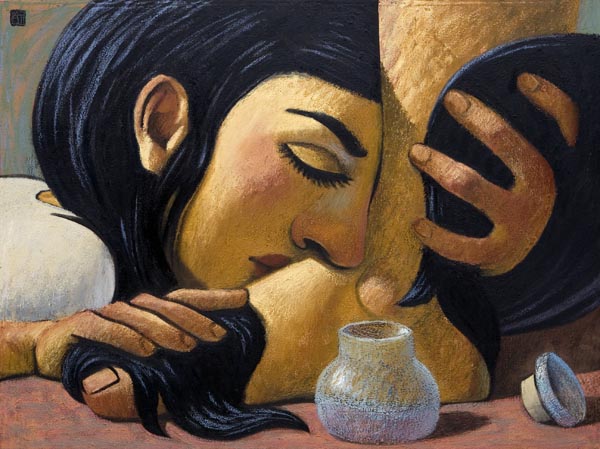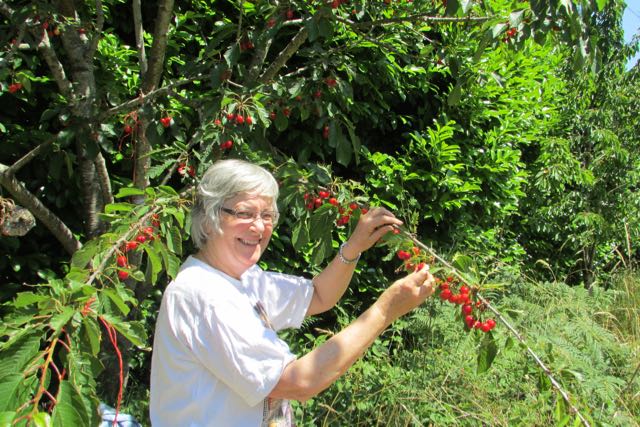
God made us to be creative, and one of the places I enjoy experimenting is in the kitchen. I find that creative cooking is a spiritual practice for me that makes me appreciate the creative character and generosity of God.
I grew up in a household where cooking was always by the book. Yes we made everything from scratch but we never deviated one ounce from the recipe. The results were always good but sometimes a little boring.
Then I married Tom. He loved recipes, but only as starting place. Nothing he made looked like the original recipe and his creations were usually more delicious than the original.
When I started vegetable gardening his creativity rubbed off big time. There is nothing like an overwhelming harvest of fruit and vegetables to stir ones creative juices and force one to come up with new recipes. Some of my favourites I have already shared:
Northwest Tomatillo and Apple Hot Sauce,
However it is time to get creative again as I enjoy the rich harvest God has provided. This week I picked over 20 lbs of cherries from our trees and decided that something new was in order. I love chocolate with cherries and almonds in it and decided that muffins or bread with similar inclusions were in order. I hunting for a recipe for Cherry Chocolate Bread and began to experiment.
As per usual I have adapted the recipes I found – cut back on the sugar, substituted yoghurt for sour cream, added almonds and almond extract and used wheat flour rather than white – the results I think are delicious and several of these will be ready to pull out of the freezer for our unexpected guests over the next few months.
Chocolate Chip Cherry Bread or Muffins:
1 cup all-purpose flour
1 1/2 cups whole wheat flour
1 cup brown or raw sugar
1/3 cup unsweetened cocoa powder
2 teaspoons baking powder
1 teaspoon baking soda
1 cup sour cream or yoghurt
1/2 cup milk
1/3 cup vegetable oil
2 eggs, beaten
1 teaspoon almond extract
1 teaspoon vanilla extract
1 1/2 cups fresh dark sweet cherries, pitted and chopped
1 cup semisweet chocolate chips
- Preheat an oven to 400 degrees F (200 degrees C). Grease 24 muffin cups or 2 loaf tins or line with parchment paper.
- Stir together the flour, sugar, cocoa powder, baking powder, and baking soda, in a separate large bowl, and make a well in the center; set aside. Whisk together the yoghurt, milk, vegetable oil, eggs, vanilla and almond extract in a bowl until evenly blended. Pour themixture into the well, then stir in the flour mixture until just combined. Fold in the cherries and chocolate chips. Spoon into prepared muffin cups, or loaf tins filling half full.
- Bake until a toothpick inserted into centers comes out clean, about 20 to 25 minutes for muffins 40-45 mins for loaf. Cool in pan on wire rack 5 minutes. Remove from pan and cool completely on wire rack. Store tightly covered at room temperature.
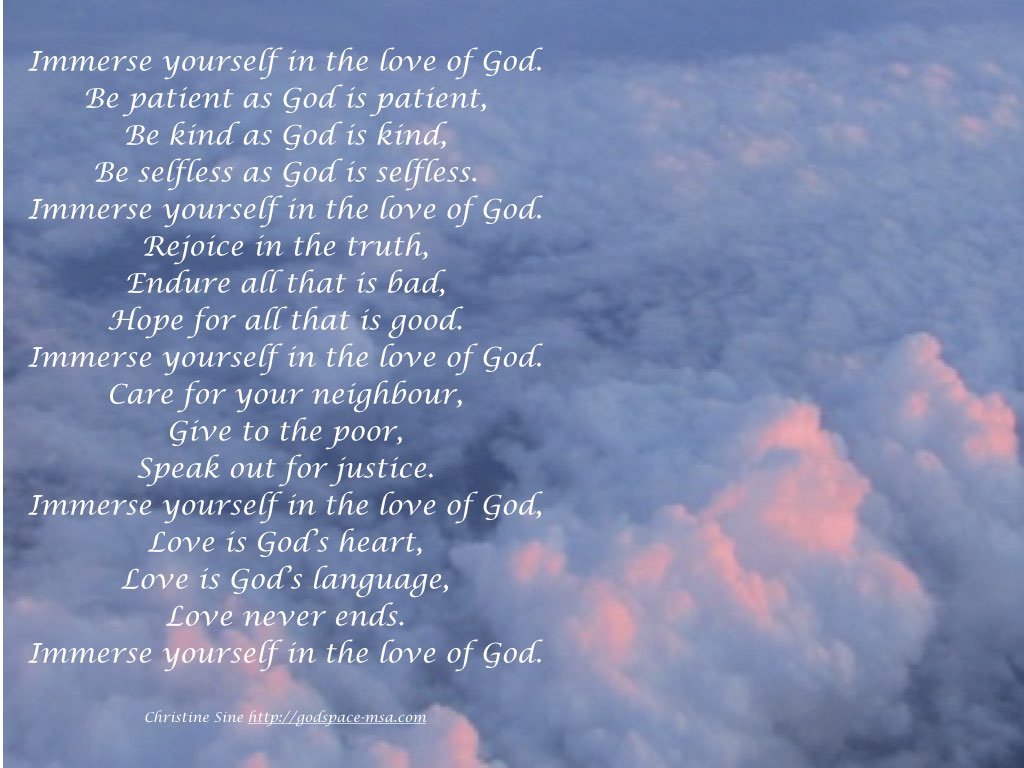 I wrote this prayer several years ago after spending time meditating on 1 Corinthians 13. I am periodically drawn back to the prayer, especially when I find myself struggling with the spiteful reactions of Christians to issues like same sex marriage and immigration reform.
I wrote this prayer several years ago after spending time meditating on 1 Corinthians 13. I am periodically drawn back to the prayer, especially when I find myself struggling with the spiteful reactions of Christians to issues like same sex marriage and immigration reform.
Immersing ourselves in the love of God is not about some warm fuzzy feeling that makes us glow when we think about God. Nor is it about aggressive approaches to doctrine and theology. It is not our doctrine but our love that shows God to others.
Immersing ourselves in the love of God is about immersing ourselves in the situations that break God’s heart, without worrying about whether everyone has crossed their theological Ts and dotted their doctrinal Is. It is about seeking to sense God’s heart in the midst of challenging situations and accepting others no matter how differently from us they think.
Jesus said to his disciples: “Love each other. Just as I have loved you, you should love each other. Your love for one another will prove to the world that you are my disciples.” (John 13:34, 35) yet so often it seems to me that what the world sees is not love but hate.
Interestingly, when I posted the prayer on the Light for the Journey Facebook page last week, it became the most popular prayer of the week. I think we all crave for God’s love to be manifested in our world. Our hearts ache for the hatred to be overcome by love. We really do need to immerse ourselves in the love of God and commit to the journey God takes us on as a result.

Spiritual formation is defined as an intentional Christian practice that has as its goal the development of spiritual maturity that leads to Christ-likeness. The term brings to mind Christian spiritual practices like study, contemplation, prayer and Sunday School. But is that really where spiritual formation happens.
I have been thinking a lot over the last few weeks about both how I accomplish spiritual formation in my own life and how I assist others to move closer to God. Most spiritual formation occurs not in formal study settings but in informal often spontaneous encounters and discussions. It is just as likely to occur walking around Costcos with our intern or picking raspberries with friends.
Walking around Costcos may not sound like the ideal place for growing ones’ spiritual life but it is often in situations like this that the rubber hits the road. As we walked we talked about the struggles we have to live simply in a culture that takes such abundance for granted. We discussed fair traded products and how we can help the poor and the marginalized through our choices. We also talked about buying organic and the ways in which we can support local family farms by investing in community supported agriculture (CSA). This may not sound like a very spiritual discussion but we covered the spectrum from social justice and the minimum wage to care for the environment.
As you know I am not a fan of teaching “spiritual formation” by sitting people down in chairs and yakking at them. Unless we give people an opportunity to practice what they are learning and show them that we are also practicing what we preach than I don’t think anyone is learning anything about what it means to be a Christian. Personally I would like to scrub Sunday school all together. Hands on spiritual learning is far more effective.
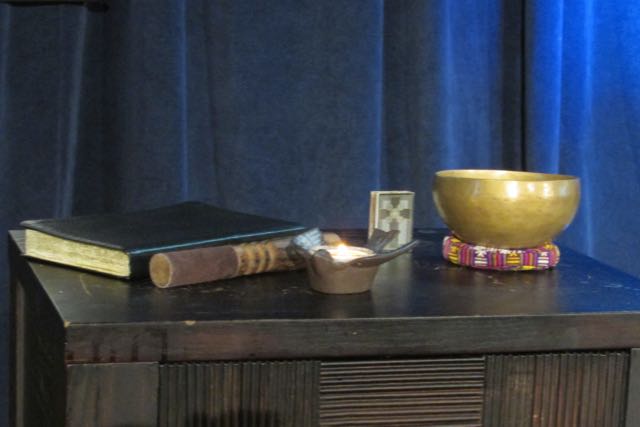
More and more of us are recognizing the benefits of meditation, but the idea of twenty minutes at a time is rather daunting. The idea of two such pauses in the day is beyond our comprehension. Fortunately, research shows that even mini-meditations throughout the day can have huge health benefits.
A few days ago I came across this excellent article with six ideas for pauses throughout the day, that enable us to relax in the present moment and renew ourselves. It started me thinking – what are the events of the day that are most likely to prompt me to pause and meditate? Here is the list I came up with.
1. Shower meditation.
Shower time can be the prefect opportunity every day to rest in the moment. It is a great metaphor for washing away the past and cleansing the mind. Notice the temperature of the water as you step into the shower, and the feel of its spray on your skin. Lather the soap and breathe in its fresh fragrance. Imagine it washing away your broken places and bringing healing to your open wounds. Watch the water disappear down the drain and imagine your anxieties disappearing with it. Imagine that the stress from your fears, worries, and problems is flowing away, out of your body and down the drain. Take deep cleansing breaths as your cares float away.
2. Walking meditation.
Most of us spend some of our day walking – whether it be as a deliberate form of exercise or just the necessity of getting from place to place. I have become very aware of that over the last few months while my walking has been inhibited by a painful foot. Yet it is easy to take that walking practice for granted.
Focus your attention on the act of walking. Stand still for 30 seconds before you begin. Stretch your muscles, take some deep breaths in and out. Take notice of your steps as you walk – are they strong and vigorous or halting and hesitant? Do they reflect your love of life or your cares and worries? Take notice of where you walk – of the cracks in the pavement and the weeds that grow, of the people you pass and the vehicles that drive by. Dwell on the experience of each step and the journey it is taking you on.
3. Let Go meditation.
The constant swirling of anxieties and worries in our minds are often what make it impossible for us to relax. Find a quiet place to sit, put your feet flat on the ground, have a straight back, and take a deep breath. Imagine it soaking deep into your lungs, your bloodstream and throughout your body. Let your breath go and quietly repeat to yourself: Then quietly repeat to yourself: “My body is at ease and relaxed” Take another deep breath and quietly remind yourself: “my heartbeat is normal, my mind is calm and my spirit is at peace. Keep repeating this until you have let go of the tension and felt your body relax. Take another deep breath and smile!
4. Have a Mindful Tea of Coffee Break
Leaving our desks and spending a few minutes in the kitchen to make a hot drink can provide a nice break. If we add mindful noticing, this time can feel even more enriching.
Turn the process of making tea or coffee into a meditative moment by slowing down every action, even if it’s only slightly. Choose a scripture like “for he satisfies the thirsty and fills the hungry with good things.” (Psalm 107:9) to repeat while you prepare your drink.
When you reach for your mug, treat it as if it’s something precious. Notice how it feels in your hand – is it cool, or warm from the dishwasher or sink? Notice how the tea bag feels when you pick it up and place it in the mug. Watch how the boiling water pours into the mug, and how the tea bag starts to turn the water a rich brown colour. Or grind your coffee and savour the rich aroma of the beans. Pour water into your french press or other coffee maker and watch it change colour. Pour it into your mug and once more savour its rich aroma before you drink it.
Noticing each individual step of the process can help us appreciate the present moment more. Instead of seeing this time as meaningless, as just a necessary thing to do in order to create a drink, we can use this time to remember that every moment can feel like a special git from God, even the seemingly mundane ones, if we just take time to slow down and notice.
5. Eat with Mindfulness and Gratitude
About a third of workers eat their lunch at their desks, and a quarter admit to answering emails or using their work phones during lunch. Separating the eating of lunch from our work, is an important and often intentionally relaxing and refocusing process.
If possible move away from your desk – preferably out of the office, though probably not in a crowded restaurant. Sit on a park bench. Begin with a prayer of gratitude, possibly with the words “Jesus you are the bread of life”. Look at your lunch and appreciate the fact that you have something to eat. Admire the colours of the food. Notice how it smells before taking a bite. Then as you eat it, focus on how it tastes, and how the texture of it feels on our tongue, gums and teeth. Doing this, even just with the first two or three bites, can help our lunch feel more satisfying, and may also help us feel a little more in control of our time and our experience in the moment, rather than feeling that we are in a never-ending rush.
6. Bedtime Meditation.
Taking a few minutes to relax and commit the coming night to God is becoming an important mini-mediation for me. I keep the prayer to welcome the night that I wrote last week on my bedside table. I sit in bed, relax my body, take a few deep breathes in and out and say the prayer quietly. I sit in silence for a minute allowing the anxieties and worries of the day to surface. I commit these to God then say the prayer again before turing off my light for the night.
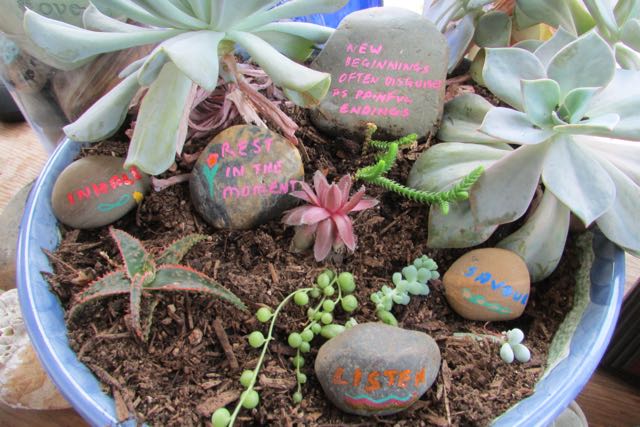 It is the beginning of a new month and the summer season is in full swing. Here in Seattle we have just gone through the hottest June on record, and this week expect more record breaking temperatures. Keeping the garden watered has taxed my ingenuity and not surprisingly I start thinking about succulents that don’t need much water.
It is the beginning of a new month and the summer season is in full swing. Here in Seattle we have just gone through the hottest June on record, and this week expect more record breaking temperatures. Keeping the garden watered has taxed my ingenuity and not surprisingly I start thinking about succulents that don’t need much water.
My new prayer garden reflects that. I have taken my favourite prayer from the month and used its central words to create focal points for my morning meditations.
What are you doing to aid your meditative practices this month?
photo credit: http://wayneforte.com/picture/anointing-his-feet-2/
Meanwhile, Jesus was in Bethany at the home of Simon, a man who had previously had leprosy. While he was eating, a woman came in with a beautiful alabaster jar of expensive perfume made from essence of nard. She broke open the jar and poured the perfume over his head. Some of those at the table were indignant. “Why waste such expensive perfume?” they asked. “It could have been sold for a year’s wages and the money given to the poor!” So they scolded her harshly.
“Who was this woman?” We know where it occurred, the extravagant cost of the perfume and even the container that it was in, we not definitely who she was. There has been much speculation over the centuries about who and what she was but no one can be sure. Most people assume the worst and think that she was a prostitute, as Luke suggests or it might have been Mary as John suggests. To the disdain and rejection shown by those eating at table with Jesus we add our own disdain and rejection to this woman.
Possibly her rejection was just because she was a woman. We forget that in Jesus time and culture women did not eat together with men. Perhaps she was rejected because she made the dinner guests feel uncomfortable – the generosity and extravagance of her gift might have been contrasted with their own lack of giving. Or perhaps she was someone unacceptable within the society – if not a prostitute then maybe ill or poor, or maybe she was a Gentile. We don’t know for sure.
What is Your Response?
All of us have times when we feel like this woman kneeling at Jesus feet. We want to share our loving gifts lavishly, but feel that they are unappreciated or misunderstood.
Sit quietly for a few minutes and think back over your own life. Remind yourself of situations in which you have felt misunderstood and unappreciated. Now imagine Jesus taking up your gift with love and gratitude, fully appreciative of all that you have done.
Write down your response.

He Qi Woman anointing Jesus Feet http://www.heqiart.com/
This story occurs just a couple of days before the Last Supper and the foretaste of the communion feast. I wondered is this because this story challenges us to think about all those that we still exclude from our table fellowship. Jesus has embraced the outcasts and is eating at their table – the tax collectors, and Simon the leper are there but they are unwilling to welcome this woman.
I think that this woman is unnamed because she represents all the nameless and rejected ones in our society whom we still refuse to welcome to our table – people that we aren’t willing to listen to because they are different from us or unacceptable in our own Christian culture.
What is your response:
Who, I wondered are we still unwilling to welcome to our table? Whose voices are we unwilling to listen to and whose offerings are we unwilling to embrace?
Sit quietly for a couple of minutes with your eyes closed. Imagine your dining room table with a group of friends around it. Who would you invite? Who would feel excluded and why? Write down your impressions. Listen to the song below. What would it take for you to live in God’s freedom and come to God’s table as this song suggests? Pray about your responses and ask God if there is anything you need to change.
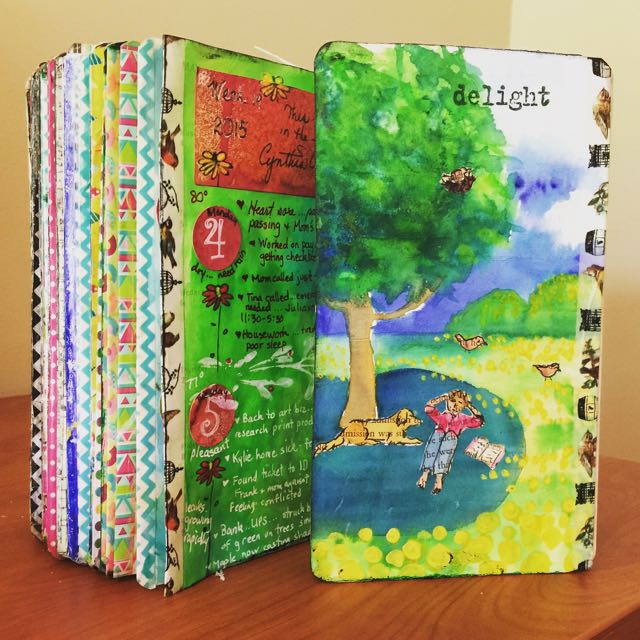
In my creative journey recently, I have been traveling down business lane, reviewing options for producing prints of my art work and methods for sharing them with the world.
I am aware of the irony involved in this undertaking. As with many aspects of life, opposing forces must be held in tension on the journey. I make art work by hand as a way to keep creativity and individual expression alive in the face of the homogenizing force of our visual culture’s global communication systems. Yet, ironically, those very systems are the mechanism to share my individual creative expressions!
I recently read a Facebook a joke about art journaling. The gist was “why buy something for $7 when you can make it yourself for $76 worth of art supplies? It’s funny because it is true. Many people ‘liked’ the post but one responder hit the nail on the head when she commented that what we are after is not the product but the creative experience. Certainly, there is an art journaling market that has risen in response to this internal hunger.
Keeping a visual journal, or art journal, is a sanctuary for creative expression, a way to nourish the soul. It is one way we celebrate and express our lives and make our individual voices heard. We record a view of our lives, creating an individual cultural product in the process.
The photo above is an example that I created this week to commemorate the delight I felt at once again being blessed with heat, new tree leaves, the color of green, and the miracle of shade after a long cold winter. Summer felt like it had arrived in mid-Spring so I took time to lay in the grass, admire the green, and soak in the life giving energy of the sun.
———————————————————————————————-
 Cynthia A. Julian: artist, writer, teacher, woman of faith and contemplative practitioner. It is my nature to create. I ‘discovered’ mixed media art journaling about four years ago. I practice art journaling because I find it satisfies my hunger to create and results in unique expressions of my life’s journey. Visit my website This Creative Journey, where this article was first posted to see a portfolio of some of my creations.
Cynthia A. Julian: artist, writer, teacher, woman of faith and contemplative practitioner. It is my nature to create. I ‘discovered’ mixed media art journaling about four years ago. I practice art journaling because I find it satisfies my hunger to create and results in unique expressions of my life’s journey. Visit my website This Creative Journey, where this article was first posted to see a portfolio of some of my creations.
As an Amazon Associate, I receive a small amount for purchases made through appropriate links.
Thank you for supporting Godspace in this way.
When referencing or quoting Godspace Light, please be sure to include the Author (Christine Sine unless otherwise noted), the Title of the article or resource, the Source link where appropriate, and ©Godspacelight.com. Thank you!

